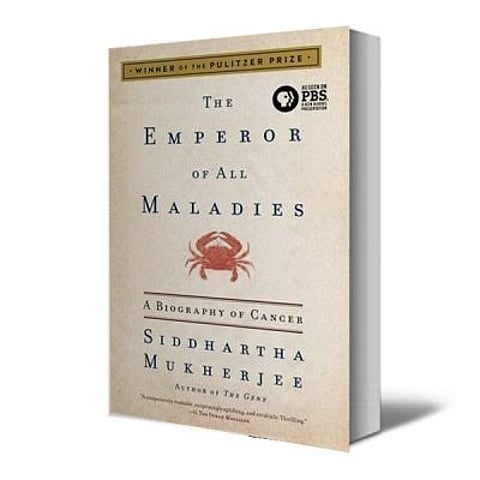Exploring the Enigma: A Trail Through the Past and Progression of Cancer
The Emperor of All Maladies: A Biography of Cancer(4.5 / 5)
Dr. Siddhartha Mukherjee's "The Emperor of All Maladies: A Biography of Cancer" is a comprehensive and insightful text that chronicles the history of cancer from its earliest recorded occurrences to the current era of genetic medicine. Dr. Mukherjee, an oncologist and researcher, tells the complex disease's story in a narrative manner that mixes his professional knowledge and experience.
The book is broken up into six sections, each of which focuses on a distinct facet of the development and management of cancer. In his opening remarks, Dr. Mukherjee discusses the early history of cancer, citing the Edwin Smith Papyrus, one of the earliest known medical manuscripts from ancient Egypt, which details the cauterization of tumors. This background information lays the groundwork for comprehending how, over millennia, attitudes toward cancer have changed.
After that, Dr. Mukherjee moves to a more recent era and highlights significant turning points in the fight against cancer. He tells the tale of Sidney Farber, the creator of contemporary chemotherapy, whose research in the 1940s on antifolates produced important breakthroughs in the treatment of leukemia. Farber's story serves as a metaphor for the larger battle the medical world is fighting to comprehend and treat cancer.
The book devotes a significant amount of its content to the advancement of different therapeutic approaches. Dr. Mukherjee examines William Halsted's groundbreaking radical mastectomy, which, despite its deforming effects, became the norm for treating breast cancer. The terrifying experiences of World War II mustard gas survivors led to the development of combination chemotherapy and radiation therapy, which are also covered in the story.
The reader is not overloaded with technical terms when Dr. Mukherjee explains the scientific concepts underlying these treatments. He talks about the scientific underpinnings of cancer, including the function of tumor suppressor genes and oncogenes, which sheds light on why cancer is so hard to cure. Detailed biographies of influential scientists and their ground-breaking discoveries—such as Robert Weinberg's discovery of the p53 tumor suppressor gene and the first human oncogene—support this theory.
"The Emperor of All Maladies" is particularly captivating due to its emphasis on the individual accounts of its sufferers. Mukherjee gives a human face to the scientific story by sharing the experiences of people like Carla Reed, a young mother with acute lymphoblastic leukemia, and her journey through diagnosis, treatment, and remission. These tales are interwoven throughout the book to give the discussion of clinical trials and treatment outcomes more nuance and compassion.
Dr. Mukherjee discusses the political and cultural aspects of cancer research as well. He talks about how President Richard Nixon's 1971 proclamation of the "War on Cancer" affected financing and public awareness, but it also brought attention to the difficulties and intricacies of cancer research. The book examines the ethical conundrums and discussions that have come up, including the use of human subjects in research and the distribution of funds among cancer types.
In the last sections, Dr. Mukherjee considers how personalized medicine and targeted medicines that target the genetic causes of cancer may change the course of cancer treatment. He stresses the value of ongoing study and the necessity of an interdisciplinary strategy that takes environmental science, immunology, and genetics into account.
"The Emperor of All Maladies" is a wonderful work of literature that provides a thorough and interesting history of cancer. Anyone interested in learning about the history, current state, and future of this widespread illness should read it because of Dr. Mukherjee's masterful storytelling and insightful scientific analysis. The book is a monument to the tenacity of sufferers and the unwavering efforts of researchers and medical professionals to solve one of humanity's most pressing problems.


